Healthcare Ethics and Law: Ethical Principles and Theories
VerifiedAdded on 2022/09/05
|9
|2230
|20
Essay
AI Summary
This essay delves into the realm of healthcare ethics and law, examining fundamental ethical principles and theories through a detailed case study. It begins by defining ethics as the study of ideal human conduct and introduces key principles such as respect for autonomy, beneficence, non-maleficence, justice, veracity, and fidelity. The essay then explores ethical theories including consequentialism, utilitarianism, and deontology, providing a framework for ethical decision-making. The core of the essay involves applying these principles and theories to a case study involving a patient with a terminal illness who refuses further treatment and requests that his wife not be informed of his condition. The analysis considers the ethical obligations of healthcare staff in this complex situation, weighing the patient's autonomy, potential benefits and harms, and the importance of honesty and fidelity. The essay concludes by synthesizing the application of ethical principles and theories to the case study, highlighting the complexities of ethical decision-making in healthcare.
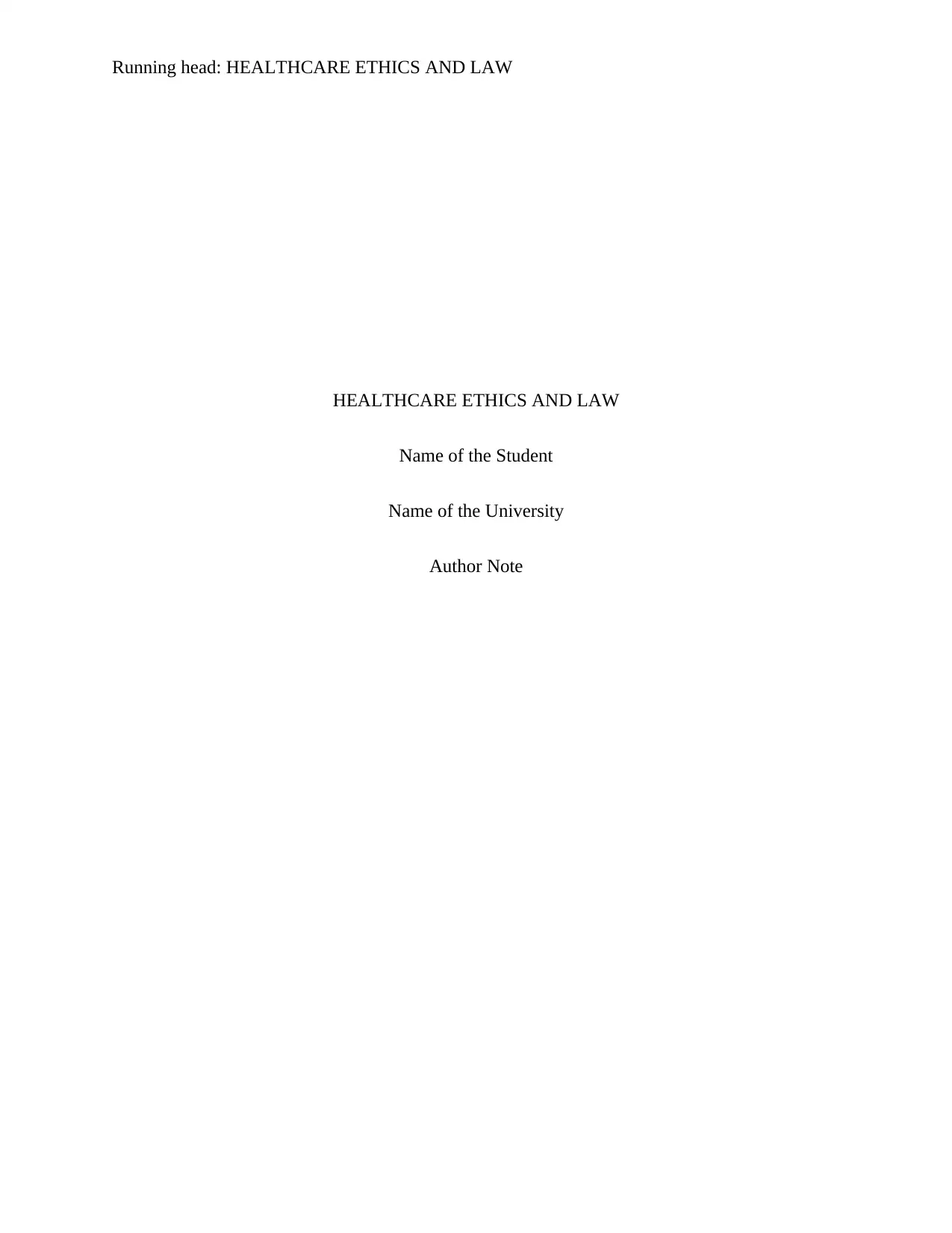
Running head: HEALTHCARE ETHICS AND LAW
HEALTHCARE ETHICS AND LAW
Name of the Student
Name of the University
Author Note
HEALTHCARE ETHICS AND LAW
Name of the Student
Name of the University
Author Note
Paraphrase This Document
Need a fresh take? Get an instant paraphrase of this document with our AI Paraphraser
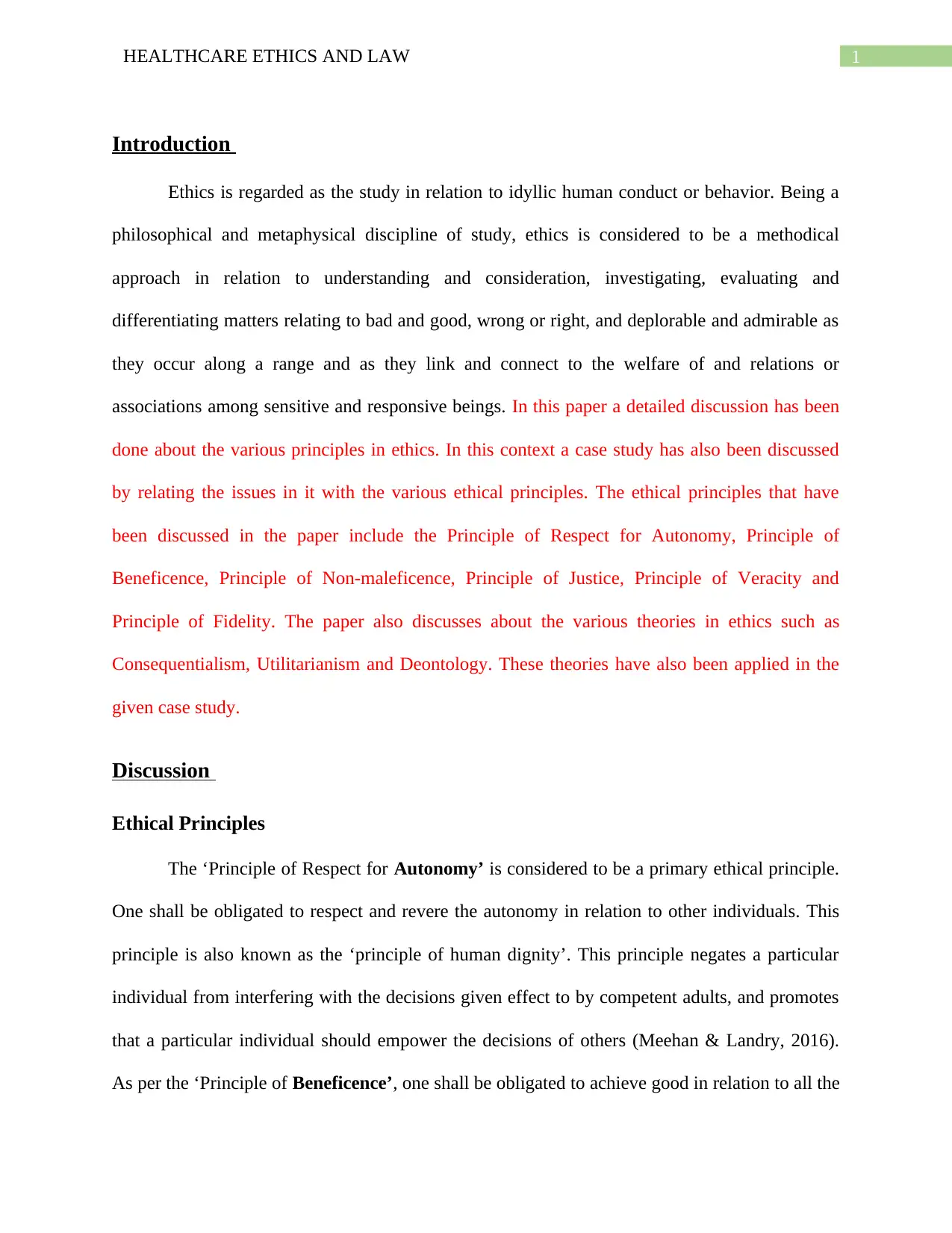
1HEALTHCARE ETHICS AND LAW
Introduction
Ethics is regarded as the study in relation to idyllic human conduct or behavior. Being a
philosophical and metaphysical discipline of study, ethics is considered to be a methodical
approach in relation to understanding and consideration, investigating, evaluating and
differentiating matters relating to bad and good, wrong or right, and deplorable and admirable as
they occur along a range and as they link and connect to the welfare of and relations or
associations among sensitive and responsive beings. In this paper a detailed discussion has been
done about the various principles in ethics. In this context a case study has also been discussed
by relating the issues in it with the various ethical principles. The ethical principles that have
been discussed in the paper include the Principle of Respect for Autonomy, Principle of
Beneficence, Principle of Non-maleficence, Principle of Justice, Principle of Veracity and
Principle of Fidelity. The paper also discusses about the various theories in ethics such as
Consequentialism, Utilitarianism and Deontology. These theories have also been applied in the
given case study.
Discussion
Ethical Principles
The ‘Principle of Respect for Autonomy’ is considered to be a primary ethical principle.
One shall be obligated to respect and revere the autonomy in relation to other individuals. This
principle is also known as the ‘principle of human dignity’. This principle negates a particular
individual from interfering with the decisions given effect to by competent adults, and promotes
that a particular individual should empower the decisions of others (Meehan & Landry, 2016).
As per the ‘Principle of Beneficence’, one shall be obligated to achieve good in relation to all the
Introduction
Ethics is regarded as the study in relation to idyllic human conduct or behavior. Being a
philosophical and metaphysical discipline of study, ethics is considered to be a methodical
approach in relation to understanding and consideration, investigating, evaluating and
differentiating matters relating to bad and good, wrong or right, and deplorable and admirable as
they occur along a range and as they link and connect to the welfare of and relations or
associations among sensitive and responsive beings. In this paper a detailed discussion has been
done about the various principles in ethics. In this context a case study has also been discussed
by relating the issues in it with the various ethical principles. The ethical principles that have
been discussed in the paper include the Principle of Respect for Autonomy, Principle of
Beneficence, Principle of Non-maleficence, Principle of Justice, Principle of Veracity and
Principle of Fidelity. The paper also discusses about the various theories in ethics such as
Consequentialism, Utilitarianism and Deontology. These theories have also been applied in the
given case study.
Discussion
Ethical Principles
The ‘Principle of Respect for Autonomy’ is considered to be a primary ethical principle.
One shall be obligated to respect and revere the autonomy in relation to other individuals. This
principle is also known as the ‘principle of human dignity’. This principle negates a particular
individual from interfering with the decisions given effect to by competent adults, and promotes
that a particular individual should empower the decisions of others (Meehan & Landry, 2016).
As per the ‘Principle of Beneficence’, one shall be obligated to achieve good in relation to all the
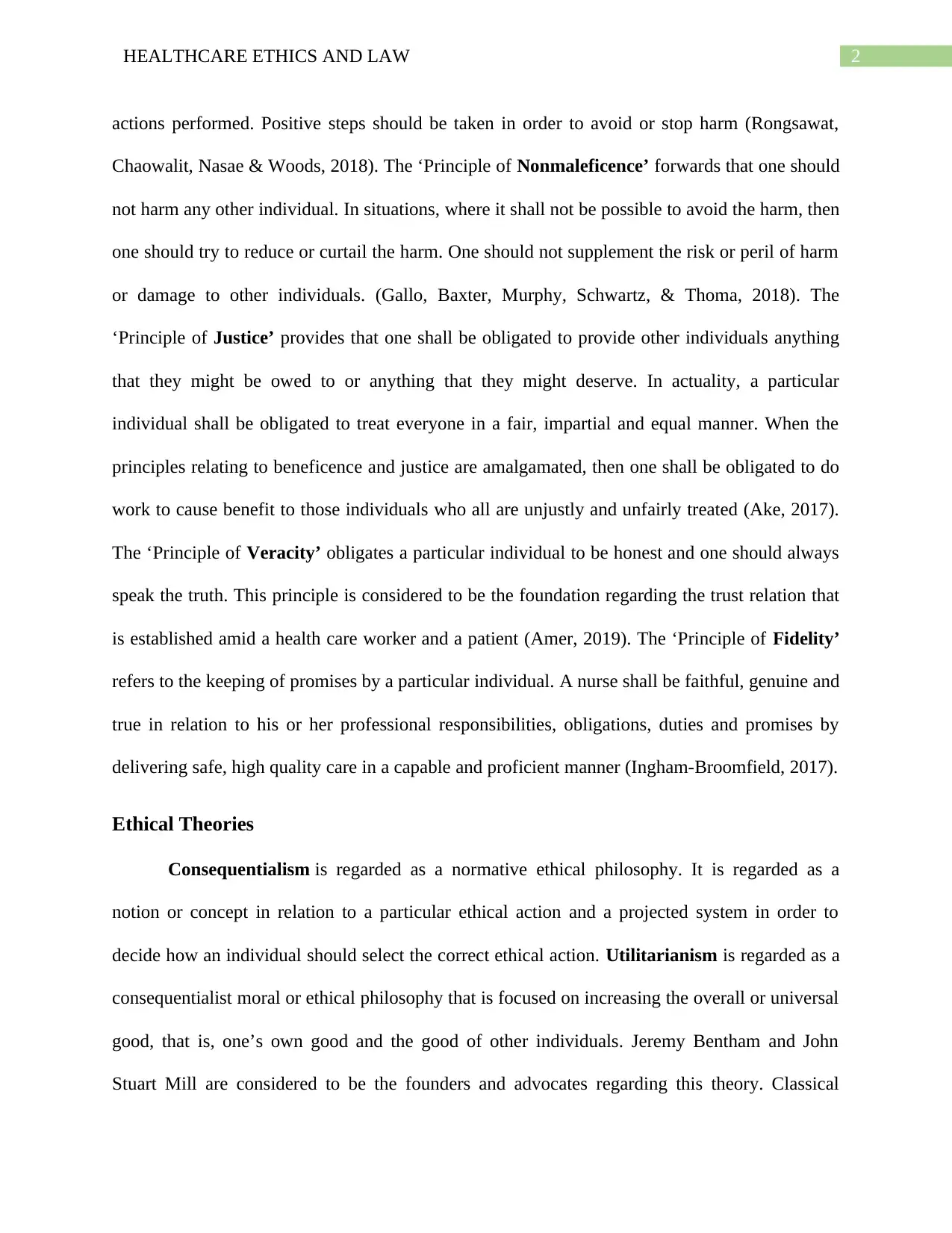
2HEALTHCARE ETHICS AND LAW
actions performed. Positive steps should be taken in order to avoid or stop harm (Rongsawat,
Chaowalit, Nasae & Woods, 2018). The ‘Principle of Nonmaleficence’ forwards that one should
not harm any other individual. In situations, where it shall not be possible to avoid the harm, then
one should try to reduce or curtail the harm. One should not supplement the risk or peril of harm
or damage to other individuals. (Gallo, Baxter, Murphy, Schwartz, & Thoma, 2018). The
‘Principle of Justice’ provides that one shall be obligated to provide other individuals anything
that they might be owed to or anything that they might deserve. In actuality, a particular
individual shall be obligated to treat everyone in a fair, impartial and equal manner. When the
principles relating to beneficence and justice are amalgamated, then one shall be obligated to do
work to cause benefit to those individuals who all are unjustly and unfairly treated (Ake, 2017).
The ‘Principle of Veracity’ obligates a particular individual to be honest and one should always
speak the truth. This principle is considered to be the foundation regarding the trust relation that
is established amid a health care worker and a patient (Amer, 2019). The ‘Principle of Fidelity’
refers to the keeping of promises by a particular individual. A nurse shall be faithful, genuine and
true in relation to his or her professional responsibilities, obligations, duties and promises by
delivering safe, high quality care in a capable and proficient manner (Ingham-Broomfield, 2017).
Ethical Theories
Consequentialism is regarded as a normative ethical philosophy. It is regarded as a
notion or concept in relation to a particular ethical action and a projected system in order to
decide how an individual should select the correct ethical action. Utilitarianism is regarded as a
consequentialist moral or ethical philosophy that is focused on increasing the overall or universal
good, that is, one’s own good and the good of other individuals. Jeremy Bentham and John
Stuart Mill are considered to be the founders and advocates regarding this theory. Classical
actions performed. Positive steps should be taken in order to avoid or stop harm (Rongsawat,
Chaowalit, Nasae & Woods, 2018). The ‘Principle of Nonmaleficence’ forwards that one should
not harm any other individual. In situations, where it shall not be possible to avoid the harm, then
one should try to reduce or curtail the harm. One should not supplement the risk or peril of harm
or damage to other individuals. (Gallo, Baxter, Murphy, Schwartz, & Thoma, 2018). The
‘Principle of Justice’ provides that one shall be obligated to provide other individuals anything
that they might be owed to or anything that they might deserve. In actuality, a particular
individual shall be obligated to treat everyone in a fair, impartial and equal manner. When the
principles relating to beneficence and justice are amalgamated, then one shall be obligated to do
work to cause benefit to those individuals who all are unjustly and unfairly treated (Ake, 2017).
The ‘Principle of Veracity’ obligates a particular individual to be honest and one should always
speak the truth. This principle is considered to be the foundation regarding the trust relation that
is established amid a health care worker and a patient (Amer, 2019). The ‘Principle of Fidelity’
refers to the keeping of promises by a particular individual. A nurse shall be faithful, genuine and
true in relation to his or her professional responsibilities, obligations, duties and promises by
delivering safe, high quality care in a capable and proficient manner (Ingham-Broomfield, 2017).
Ethical Theories
Consequentialism is regarded as a normative ethical philosophy. It is regarded as a
notion or concept in relation to a particular ethical action and a projected system in order to
decide how an individual should select the correct ethical action. Utilitarianism is regarded as a
consequentialist moral or ethical philosophy that is focused on increasing the overall or universal
good, that is, one’s own good and the good of other individuals. Jeremy Bentham and John
Stuart Mill are considered to be the founders and advocates regarding this theory. Classical
⊘ This is a preview!⊘
Do you want full access?
Subscribe today to unlock all pages.

Trusted by 1+ million students worldwide
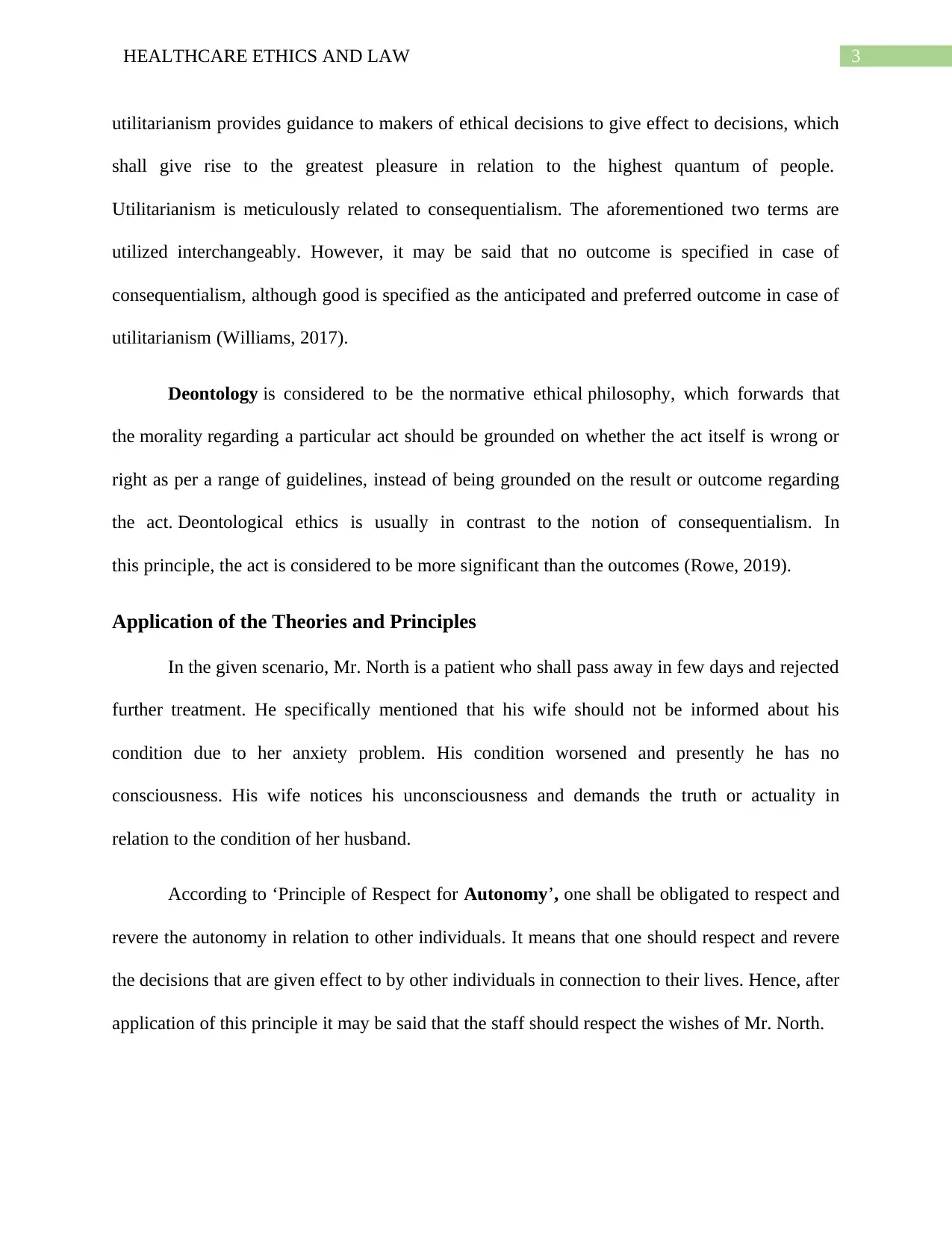
3HEALTHCARE ETHICS AND LAW
utilitarianism provides guidance to makers of ethical decisions to give effect to decisions, which
shall give rise to the greatest pleasure in relation to the highest quantum of people.
Utilitarianism is meticulously related to consequentialism. The aforementioned two terms are
utilized interchangeably. However, it may be said that no outcome is specified in case of
consequentialism, although good is specified as the anticipated and preferred outcome in case of
utilitarianism (Williams, 2017).
Deontology is considered to be the normative ethical philosophy, which forwards that
the morality regarding a particular act should be grounded on whether the act itself is wrong or
right as per a range of guidelines, instead of being grounded on the result or outcome regarding
the act. Deontological ethics is usually in contrast to the notion of consequentialism. In
this principle, the act is considered to be more significant than the outcomes (Rowe, 2019).
Application of the Theories and Principles
In the given scenario, Mr. North is a patient who shall pass away in few days and rejected
further treatment. He specifically mentioned that his wife should not be informed about his
condition due to her anxiety problem. His condition worsened and presently he has no
consciousness. His wife notices his unconsciousness and demands the truth or actuality in
relation to the condition of her husband.
According to ‘Principle of Respect for Autonomy’, one shall be obligated to respect and
revere the autonomy in relation to other individuals. It means that one should respect and revere
the decisions that are given effect to by other individuals in connection to their lives. Hence, after
application of this principle it may be said that the staff should respect the wishes of Mr. North.
utilitarianism provides guidance to makers of ethical decisions to give effect to decisions, which
shall give rise to the greatest pleasure in relation to the highest quantum of people.
Utilitarianism is meticulously related to consequentialism. The aforementioned two terms are
utilized interchangeably. However, it may be said that no outcome is specified in case of
consequentialism, although good is specified as the anticipated and preferred outcome in case of
utilitarianism (Williams, 2017).
Deontology is considered to be the normative ethical philosophy, which forwards that
the morality regarding a particular act should be grounded on whether the act itself is wrong or
right as per a range of guidelines, instead of being grounded on the result or outcome regarding
the act. Deontological ethics is usually in contrast to the notion of consequentialism. In
this principle, the act is considered to be more significant than the outcomes (Rowe, 2019).
Application of the Theories and Principles
In the given scenario, Mr. North is a patient who shall pass away in few days and rejected
further treatment. He specifically mentioned that his wife should not be informed about his
condition due to her anxiety problem. His condition worsened and presently he has no
consciousness. His wife notices his unconsciousness and demands the truth or actuality in
relation to the condition of her husband.
According to ‘Principle of Respect for Autonomy’, one shall be obligated to respect and
revere the autonomy in relation to other individuals. It means that one should respect and revere
the decisions that are given effect to by other individuals in connection to their lives. Hence, after
application of this principle it may be said that the staff should respect the wishes of Mr. North.
Paraphrase This Document
Need a fresh take? Get an instant paraphrase of this document with our AI Paraphraser
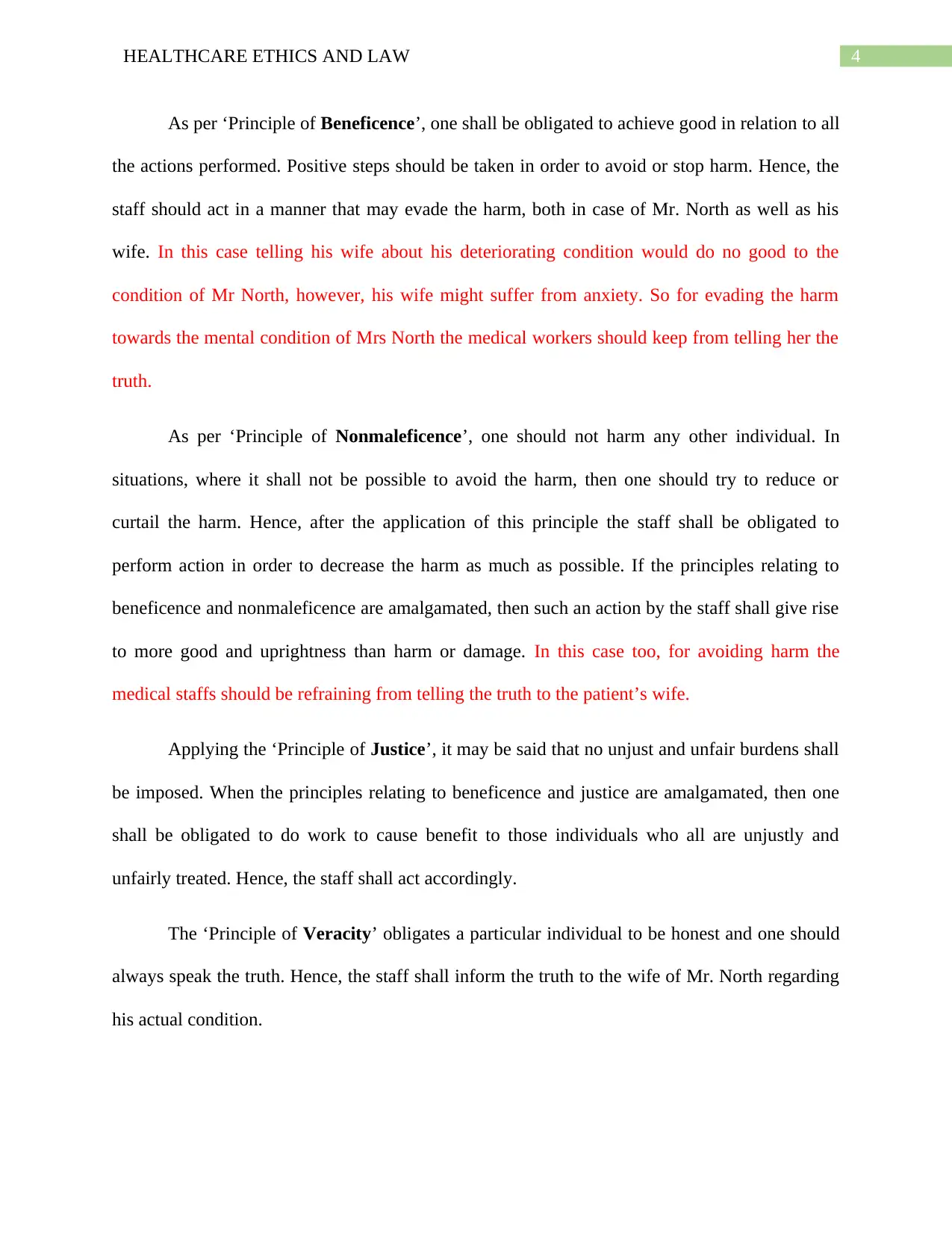
4HEALTHCARE ETHICS AND LAW
As per ‘Principle of Beneficence’, one shall be obligated to achieve good in relation to all
the actions performed. Positive steps should be taken in order to avoid or stop harm. Hence, the
staff should act in a manner that may evade the harm, both in case of Mr. North as well as his
wife. In this case telling his wife about his deteriorating condition would do no good to the
condition of Mr North, however, his wife might suffer from anxiety. So for evading the harm
towards the mental condition of Mrs North the medical workers should keep from telling her the
truth.
As per ‘Principle of Nonmaleficence’, one should not harm any other individual. In
situations, where it shall not be possible to avoid the harm, then one should try to reduce or
curtail the harm. Hence, after the application of this principle the staff shall be obligated to
perform action in order to decrease the harm as much as possible. If the principles relating to
beneficence and nonmaleficence are amalgamated, then such an action by the staff shall give rise
to more good and uprightness than harm or damage. In this case too, for avoiding harm the
medical staffs should be refraining from telling the truth to the patient’s wife.
Applying the ‘Principle of Justice’, it may be said that no unjust and unfair burdens shall
be imposed. When the principles relating to beneficence and justice are amalgamated, then one
shall be obligated to do work to cause benefit to those individuals who all are unjustly and
unfairly treated. Hence, the staff shall act accordingly.
The ‘Principle of Veracity’ obligates a particular individual to be honest and one should
always speak the truth. Hence, the staff shall inform the truth to the wife of Mr. North regarding
his actual condition.
As per ‘Principle of Beneficence’, one shall be obligated to achieve good in relation to all
the actions performed. Positive steps should be taken in order to avoid or stop harm. Hence, the
staff should act in a manner that may evade the harm, both in case of Mr. North as well as his
wife. In this case telling his wife about his deteriorating condition would do no good to the
condition of Mr North, however, his wife might suffer from anxiety. So for evading the harm
towards the mental condition of Mrs North the medical workers should keep from telling her the
truth.
As per ‘Principle of Nonmaleficence’, one should not harm any other individual. In
situations, where it shall not be possible to avoid the harm, then one should try to reduce or
curtail the harm. Hence, after the application of this principle the staff shall be obligated to
perform action in order to decrease the harm as much as possible. If the principles relating to
beneficence and nonmaleficence are amalgamated, then such an action by the staff shall give rise
to more good and uprightness than harm or damage. In this case too, for avoiding harm the
medical staffs should be refraining from telling the truth to the patient’s wife.
Applying the ‘Principle of Justice’, it may be said that no unjust and unfair burdens shall
be imposed. When the principles relating to beneficence and justice are amalgamated, then one
shall be obligated to do work to cause benefit to those individuals who all are unjustly and
unfairly treated. Hence, the staff shall act accordingly.
The ‘Principle of Veracity’ obligates a particular individual to be honest and one should
always speak the truth. Hence, the staff shall inform the truth to the wife of Mr. North regarding
his actual condition.
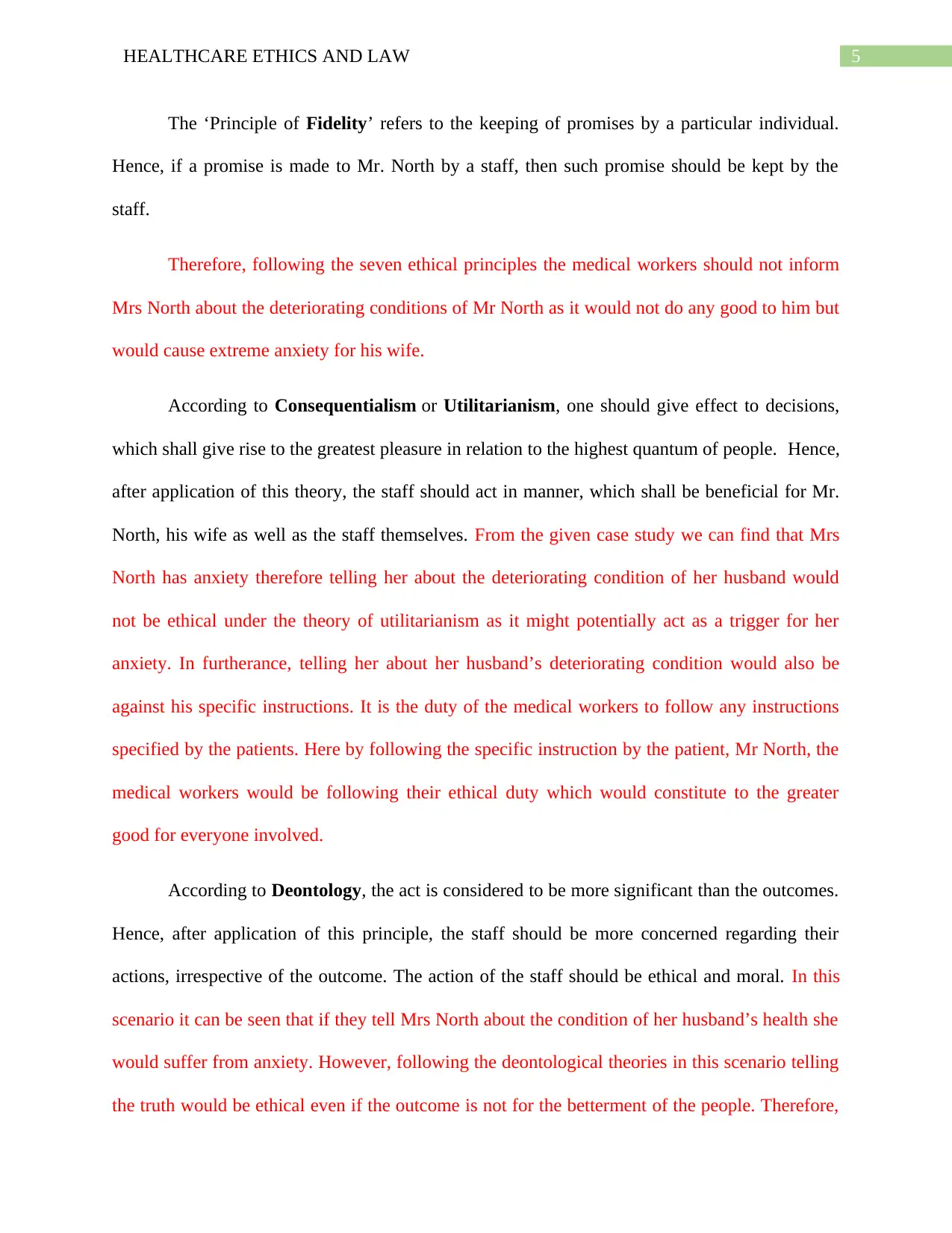
5HEALTHCARE ETHICS AND LAW
The ‘Principle of Fidelity’ refers to the keeping of promises by a particular individual.
Hence, if a promise is made to Mr. North by a staff, then such promise should be kept by the
staff.
Therefore, following the seven ethical principles the medical workers should not inform
Mrs North about the deteriorating conditions of Mr North as it would not do any good to him but
would cause extreme anxiety for his wife.
According to Consequentialism or Utilitarianism, one should give effect to decisions,
which shall give rise to the greatest pleasure in relation to the highest quantum of people. Hence,
after application of this theory, the staff should act in manner, which shall be beneficial for Mr.
North, his wife as well as the staff themselves. From the given case study we can find that Mrs
North has anxiety therefore telling her about the deteriorating condition of her husband would
not be ethical under the theory of utilitarianism as it might potentially act as a trigger for her
anxiety. In furtherance, telling her about her husband’s deteriorating condition would also be
against his specific instructions. It is the duty of the medical workers to follow any instructions
specified by the patients. Here by following the specific instruction by the patient, Mr North, the
medical workers would be following their ethical duty which would constitute to the greater
good for everyone involved.
According to Deontology, the act is considered to be more significant than the outcomes.
Hence, after application of this principle, the staff should be more concerned regarding their
actions, irrespective of the outcome. The action of the staff should be ethical and moral. In this
scenario it can be seen that if they tell Mrs North about the condition of her husband’s health she
would suffer from anxiety. However, following the deontological theories in this scenario telling
the truth would be ethical even if the outcome is not for the betterment of the people. Therefore,
The ‘Principle of Fidelity’ refers to the keeping of promises by a particular individual.
Hence, if a promise is made to Mr. North by a staff, then such promise should be kept by the
staff.
Therefore, following the seven ethical principles the medical workers should not inform
Mrs North about the deteriorating conditions of Mr North as it would not do any good to him but
would cause extreme anxiety for his wife.
According to Consequentialism or Utilitarianism, one should give effect to decisions,
which shall give rise to the greatest pleasure in relation to the highest quantum of people. Hence,
after application of this theory, the staff should act in manner, which shall be beneficial for Mr.
North, his wife as well as the staff themselves. From the given case study we can find that Mrs
North has anxiety therefore telling her about the deteriorating condition of her husband would
not be ethical under the theory of utilitarianism as it might potentially act as a trigger for her
anxiety. In furtherance, telling her about her husband’s deteriorating condition would also be
against his specific instructions. It is the duty of the medical workers to follow any instructions
specified by the patients. Here by following the specific instruction by the patient, Mr North, the
medical workers would be following their ethical duty which would constitute to the greater
good for everyone involved.
According to Deontology, the act is considered to be more significant than the outcomes.
Hence, after application of this principle, the staff should be more concerned regarding their
actions, irrespective of the outcome. The action of the staff should be ethical and moral. In this
scenario it can be seen that if they tell Mrs North about the condition of her husband’s health she
would suffer from anxiety. However, following the deontological theories in this scenario telling
the truth would be ethical even if the outcome is not for the betterment of the people. Therefore,
⊘ This is a preview!⊘
Do you want full access?
Subscribe today to unlock all pages.

Trusted by 1+ million students worldwide
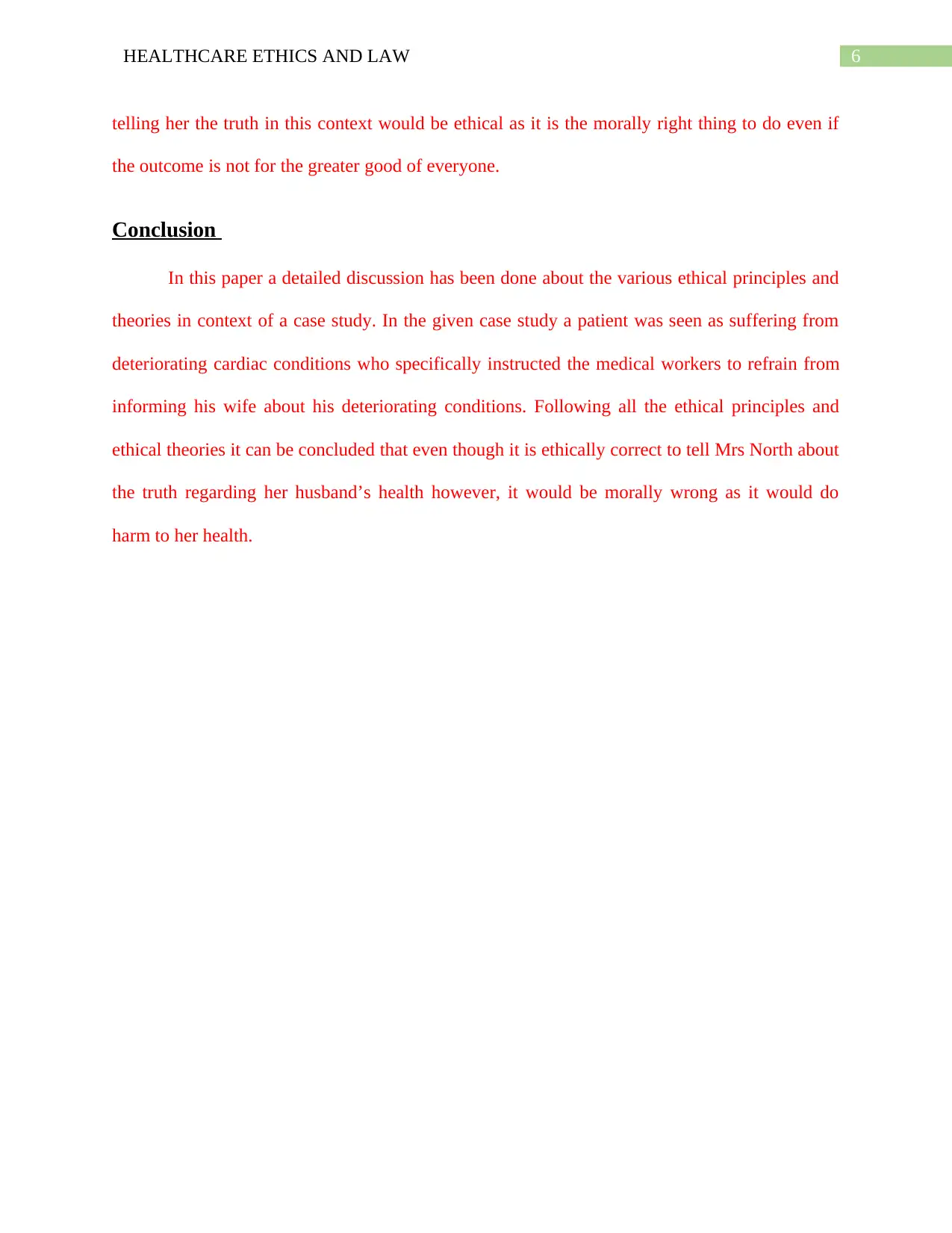
6HEALTHCARE ETHICS AND LAW
telling her the truth in this context would be ethical as it is the morally right thing to do even if
the outcome is not for the greater good of everyone.
Conclusion
In this paper a detailed discussion has been done about the various ethical principles and
theories in context of a case study. In the given case study a patient was seen as suffering from
deteriorating cardiac conditions who specifically instructed the medical workers to refrain from
informing his wife about his deteriorating conditions. Following all the ethical principles and
ethical theories it can be concluded that even though it is ethically correct to tell Mrs North about
the truth regarding her husband’s health however, it would be morally wrong as it would do
harm to her health.
telling her the truth in this context would be ethical as it is the morally right thing to do even if
the outcome is not for the greater good of everyone.
Conclusion
In this paper a detailed discussion has been done about the various ethical principles and
theories in context of a case study. In the given case study a patient was seen as suffering from
deteriorating cardiac conditions who specifically instructed the medical workers to refrain from
informing his wife about his deteriorating conditions. Following all the ethical principles and
ethical theories it can be concluded that even though it is ethically correct to tell Mrs North about
the truth regarding her husband’s health however, it would be morally wrong as it would do
harm to her health.
Paraphrase This Document
Need a fresh take? Get an instant paraphrase of this document with our AI Paraphraser
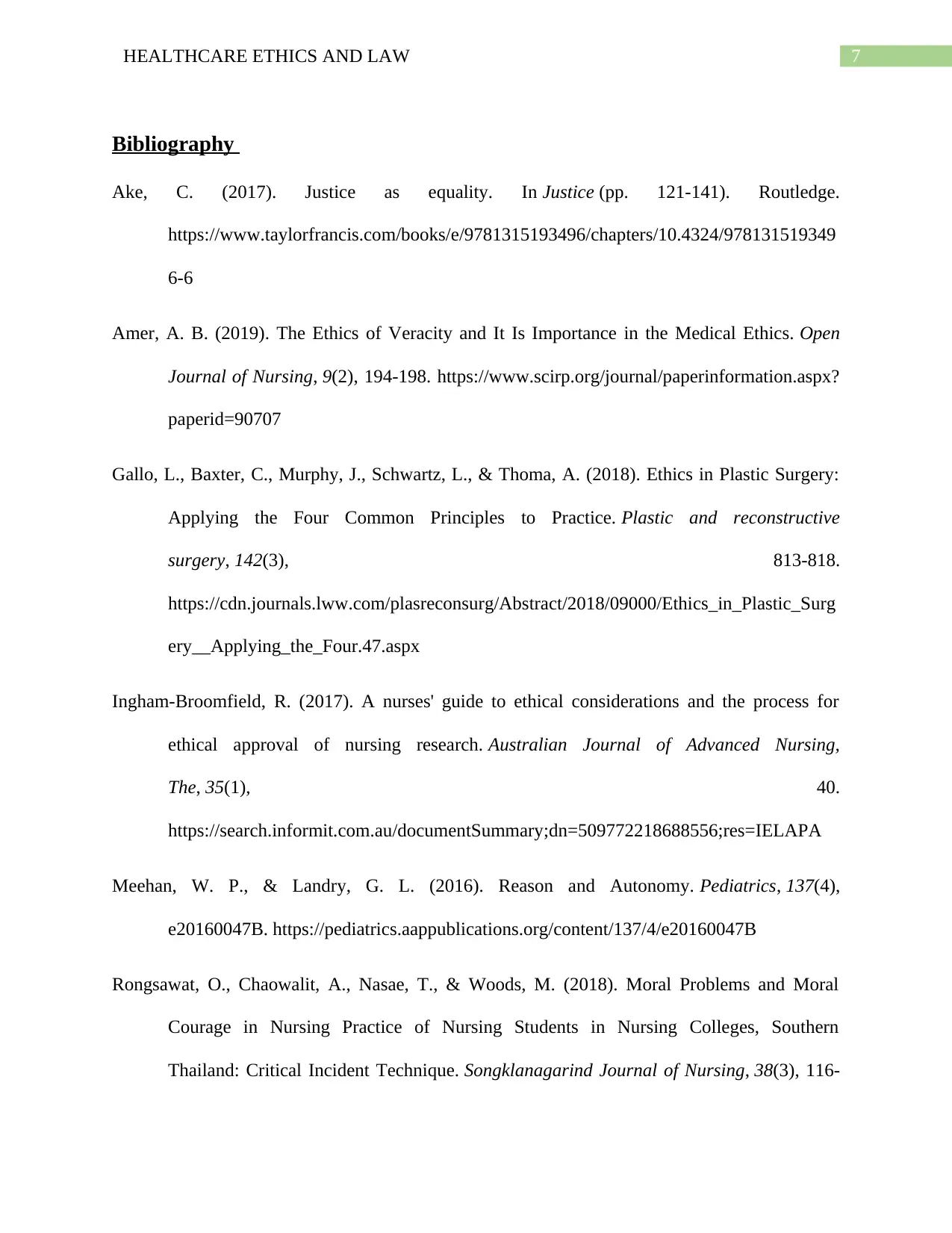
7HEALTHCARE ETHICS AND LAW
Bibliography
Ake, C. (2017). Justice as equality. In Justice (pp. 121-141). Routledge.
https://www.taylorfrancis.com/books/e/9781315193496/chapters/10.4324/978131519349
6-6
Amer, A. B. (2019). The Ethics of Veracity and It Is Importance in the Medical Ethics. Open
Journal of Nursing, 9(2), 194-198. https://www.scirp.org/journal/paperinformation.aspx?
paperid=90707
Gallo, L., Baxter, C., Murphy, J., Schwartz, L., & Thoma, A. (2018). Ethics in Plastic Surgery:
Applying the Four Common Principles to Practice. Plastic and reconstructive
surgery, 142(3), 813-818.
https://cdn.journals.lww.com/plasreconsurg/Abstract/2018/09000/Ethics_in_Plastic_Surg
ery__Applying_the_Four.47.aspx
Ingham-Broomfield, R. (2017). A nurses' guide to ethical considerations and the process for
ethical approval of nursing research. Australian Journal of Advanced Nursing,
The, 35(1), 40.
https://search.informit.com.au/documentSummary;dn=509772218688556;res=IELAPA
Meehan, W. P., & Landry, G. L. (2016). Reason and Autonomy. Pediatrics, 137(4),
e20160047B. https://pediatrics.aappublications.org/content/137/4/e20160047B
Rongsawat, O., Chaowalit, A., Nasae, T., & Woods, M. (2018). Moral Problems and Moral
Courage in Nursing Practice of Nursing Students in Nursing Colleges, Southern
Thailand: Critical Incident Technique. Songklanagarind Journal of Nursing, 38(3), 116-
Bibliography
Ake, C. (2017). Justice as equality. In Justice (pp. 121-141). Routledge.
https://www.taylorfrancis.com/books/e/9781315193496/chapters/10.4324/978131519349
6-6
Amer, A. B. (2019). The Ethics of Veracity and It Is Importance in the Medical Ethics. Open
Journal of Nursing, 9(2), 194-198. https://www.scirp.org/journal/paperinformation.aspx?
paperid=90707
Gallo, L., Baxter, C., Murphy, J., Schwartz, L., & Thoma, A. (2018). Ethics in Plastic Surgery:
Applying the Four Common Principles to Practice. Plastic and reconstructive
surgery, 142(3), 813-818.
https://cdn.journals.lww.com/plasreconsurg/Abstract/2018/09000/Ethics_in_Plastic_Surg
ery__Applying_the_Four.47.aspx
Ingham-Broomfield, R. (2017). A nurses' guide to ethical considerations and the process for
ethical approval of nursing research. Australian Journal of Advanced Nursing,
The, 35(1), 40.
https://search.informit.com.au/documentSummary;dn=509772218688556;res=IELAPA
Meehan, W. P., & Landry, G. L. (2016). Reason and Autonomy. Pediatrics, 137(4),
e20160047B. https://pediatrics.aappublications.org/content/137/4/e20160047B
Rongsawat, O., Chaowalit, A., Nasae, T., & Woods, M. (2018). Moral Problems and Moral
Courage in Nursing Practice of Nursing Students in Nursing Colleges, Southern
Thailand: Critical Incident Technique. Songklanagarind Journal of Nursing, 38(3), 116-
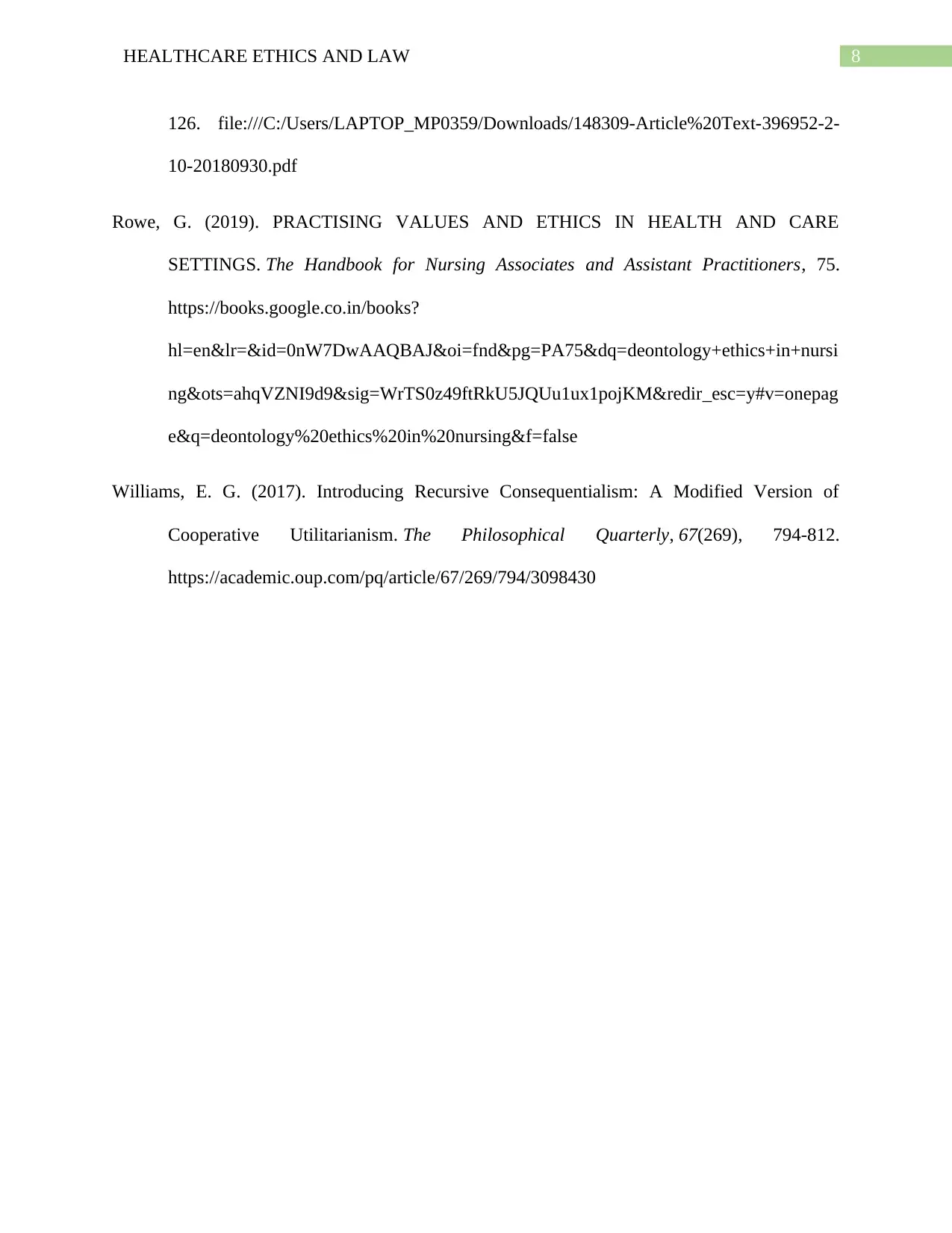
8HEALTHCARE ETHICS AND LAW
126. file:///C:/Users/LAPTOP_MP0359/Downloads/148309-Article%20Text-396952-2-
10-20180930.pdf
Rowe, G. (2019). PRACTISING VALUES AND ETHICS IN HEALTH AND CARE
SETTINGS. The Handbook for Nursing Associates and Assistant Practitioners, 75.
https://books.google.co.in/books?
hl=en&lr=&id=0nW7DwAAQBAJ&oi=fnd&pg=PA75&dq=deontology+ethics+in+nursi
ng&ots=ahqVZNI9d9&sig=WrTS0z49ftRkU5JQUu1ux1pojKM&redir_esc=y#v=onepag
e&q=deontology%20ethics%20in%20nursing&f=false
Williams, E. G. (2017). Introducing Recursive Consequentialism: A Modified Version of
Cooperative Utilitarianism. The Philosophical Quarterly, 67(269), 794-812.
https://academic.oup.com/pq/article/67/269/794/3098430
126. file:///C:/Users/LAPTOP_MP0359/Downloads/148309-Article%20Text-396952-2-
10-20180930.pdf
Rowe, G. (2019). PRACTISING VALUES AND ETHICS IN HEALTH AND CARE
SETTINGS. The Handbook for Nursing Associates and Assistant Practitioners, 75.
https://books.google.co.in/books?
hl=en&lr=&id=0nW7DwAAQBAJ&oi=fnd&pg=PA75&dq=deontology+ethics+in+nursi
ng&ots=ahqVZNI9d9&sig=WrTS0z49ftRkU5JQUu1ux1pojKM&redir_esc=y#v=onepag
e&q=deontology%20ethics%20in%20nursing&f=false
Williams, E. G. (2017). Introducing Recursive Consequentialism: A Modified Version of
Cooperative Utilitarianism. The Philosophical Quarterly, 67(269), 794-812.
https://academic.oup.com/pq/article/67/269/794/3098430
⊘ This is a preview!⊘
Do you want full access?
Subscribe today to unlock all pages.

Trusted by 1+ million students worldwide
1 out of 9
Related Documents
Your All-in-One AI-Powered Toolkit for Academic Success.
+13062052269
info@desklib.com
Available 24*7 on WhatsApp / Email
![[object Object]](/_next/static/media/star-bottom.7253800d.svg)
Unlock your academic potential
Copyright © 2020–2026 A2Z Services. All Rights Reserved. Developed and managed by ZUCOL.





